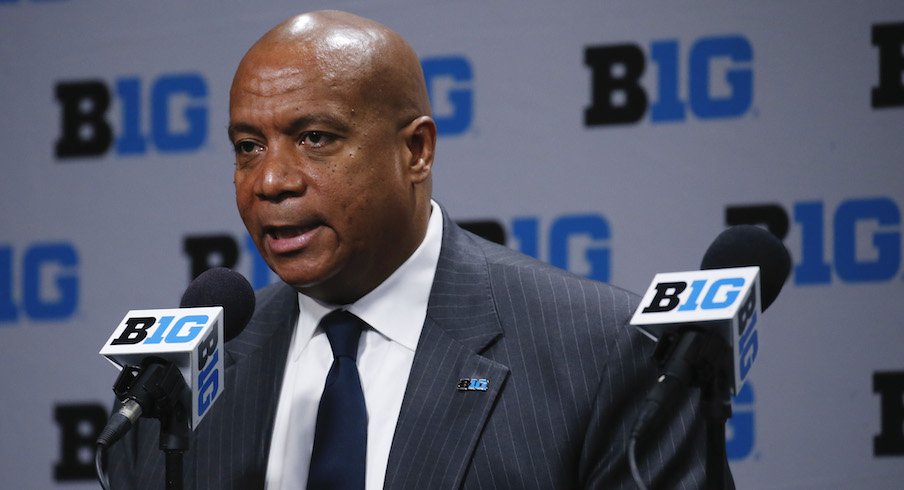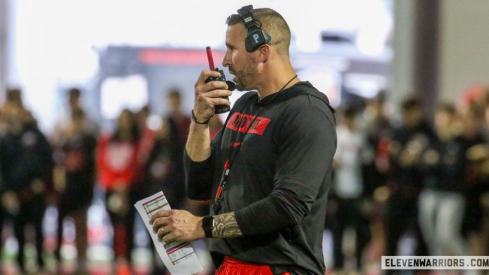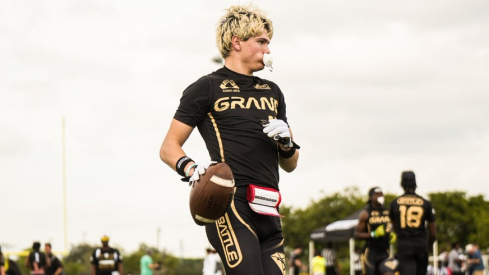Kevin Warren isn’t ready to make any bold proclamations about if and when there will be a Big Ten football season this fall.
While some other leaders in college athletics have started to speak out about when they expect football games or team activities to resume – and in some cases, have had to clarify those comments just hours later – Warren believes it’s his responsibility as the Big Ten’s new commissioner not to speak out of turn. Rather than speculate on what might happen or opine on what could happen, Warren wants he and his colleagues around the conference to take the appropriate amount of time needed before jumping into any decisions.
“One of the things that is really important is to make sure that I just don’t make flippant comments,” Warren said during an interview on Big Ten Network on Monday. “I try to be very thoughtful, to gather information.”
While Warren, like everyone else involved in Big Ten athletics, surely wants football and other sports to be played this fall, he recognizes the importance of making smart decisions. As college sports face unprecedented circumstances due to the COVID-19 pandemic, the decisions he and other leaders in college athletics make now have the potential to set a precedent for similar situations that might arise in the future – and he doesn’t want that precedent to be a bad one.
“This will be a time in history that people will look back on to see how we handled it,” Warren said. “I’m very conscious and cognizant that the decisions that we make today will impact the landscape of college sports for the next 10, 15, 25 years.”
That’s not to say that Warren doesn’t want to start making decisions sooner than later, though.
“I’m working on it every single day of the week,” Warren said. “It’s top of mind with me. And I think as we get into the early part of June that we’ll be in a position that we’ll be able to make tangible decisions.”
Warren believes “the next 6-8 weeks will be paramount” as states around the country start to ease restrictions, professional sports leagues start to resume operations and colleges work toward potentially reopening this fall. As more and more data emerges about the spread of COVID-19, whether cases are increasing or decreasing, potential treatments and how long the pandemic could last, Warren and his colleagues “will be watching closely” to gather information that can guide the Big Ten’s own decisions.
“I’m very conscious and cognizant that the decisions that we make today will impact the landscape of college sports for the next 10, 15, 25 years.”– Big Ten commissioner Kevin Warren
The top priority in all of those decisions, Warren said, has to be the safety of each Big Ten school’s students – not only student-athletes, but other students on campus as well.
“We have a responsibility that we need to make sure that our campuses are safe,” Warren said. “And so before we can even talk about, when is the appropriate time for return to play, we need to discuss the issue of when is the appropriate time to have our students, our professors, our people to be able to go back on campus.
“Our goal in everything we do in the Big Ten is to put our student-athletes at the center of all of our decisions, and do what’s right by them, and view them just like we would if they were our son or daughter or our grandson or granddaughter.”
University leaders around the Big Ten have already taken several steps to work toward the return to campus operations and eventually athletic operations, including the formation of a Task Force for Emerging Infectious Diseases, consisting of leaders from each of the Big Ten’s 14 member schools who are guiding the conference in determining best practices for a safe return to campus and ultimately, college sports.
Warren said he has daily calls with the Big Ten’s athletic directors and with the commissioners of the other Power 5 conferences, and has regular calls with Big Ten head coaches, university presidents, faculty athletic representatives and senior woman administrators.
Ultimately, Warren wants to make sure the Big Ten makes decisions that are in the best interest of its member institutions, even if some of those decisions potentially differ from decisions made by other conferences. And like SEC commissioner Greg Sankey, who said last week “there is room for different conferences to make different decisions,” Warren didn’t rule out the possibility that the Big Ten could have fall sports even if other conferences don’t.
“The Big Ten is the Big Ten for a certain reason. Which means we will always, to the best of our abilities, do what we feel is the right thing to do,” Warren said. “Sometimes that may mean that we’re with a group. Sometimes that may mean that we do things from an independent standpoint. But I will always say that my goal is to make sure that we feel comfortable that we do the right thing.”
For now, organized team activities are suspended for all Big Ten sports teams until at least June 1, and Warren – like so many others across the country – is working from home. Still, he says he has been working approximately 14 hours per day, and he’s proud of what the Big Ten has been able to accomplish – including the development of the Mental Health and Wellness Cabinet, which the conference officially announced Monday – in the midst of a pandemic.
Once campuses are open and college sports are happening again, Warren believes the Big Ten will ultimately be stronger than it’s ever been before because of how they’ve made the best of their current circumstances.
“One of the great silver opportunities in this is that it has forced us as a society to make sure that we communicate more with each other, and I just thought back, and this did not happen, we would have never had this much communication, collaboration and interaction with each other,” Warren said. “So I think this is a great time for us as a conference to be a thought leader, to deal with these issues that maybe we weren’t comfortable dealing with before, but to take the time and energy from a gratitude and creativity standpoint to do the things we need to do.
“This is a blessing to have this time. We never get this time to do it. And I’m confident that when we come out of this pandemic, which we will, we’ll be even better and stronger.”


